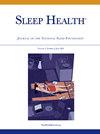Associations of sleep duration and weekend catch up sleep with cancer risk among US adults in the Cancer Prevention Study-3 cohort
IF 3.4
2区 医学
Q2 CLINICAL NEUROLOGY
引用次数: 0
Abstract
Objective
Our objective was to investigate the associations of sleep duration and weekend catch-up sleep with cancer risk among US adults in the Cancer Prevention Study-3.
Methods
Cancer Prevention Study-3 is a prospective cohort of approximately 250,000 US adults aged 30-65 years. At baseline (2006-2013), participants were asked to report their average daily sleep duration over the past year for weekdays and weekends separately. Using the midpoint of each sleep duration category, a 5:2 weekday:weekend weighted average was created. Weekend catch-up sleep was calculated using the difference of weekend and weekday sleep duration category midpoints and categorized as −4 or −2, 0, 2, and 4 hours. Cancer incidence (overall and female breast) was determined via linkage to state registries; follow-up time ended at the time of cancer diagnosis, time of death, or end of follow-up (12/31/2018). We used multivariable Cox proportional hazards models to estimate adjusted hazard ratios and 95% confidence intervals for the associations of sleep duration and weekend catch-up sleep with cancer risk adjusted for sociodemographics, socioeconomic status, comorbidities, and lifestyle behaviors.
Results
A total of 10,256 incident cancer cases were reported among the 248,086 participants included in the study. We found no statistically significant associations between the examined sleep characteristics with overall or breast cancer-specific risk.
Conclusion
Our research strengthens the existing null findings of the association between sleep duration and cancer risk. This was the first study to investigate the relationship of weekend catch-up sleep with cancer risk and more research is necessary to further elucidate this relationship.
在癌症预防研究3队列中,美国成年人的睡眠时间和周末补觉与癌症风险的关系
目的:我们的目的是在癌症预防研究3中调查美国成年人的睡眠时间和周末补觉与癌症风险的关系。方法:癌症预防研究-3是一项前瞻性队列研究,约250,000名年龄在30-65岁的美国成年人。在基线(2006-2013年),参与者被要求分别报告过去一年工作日和周末的平均每日睡眠时间。利用每个睡眠时间类别的中点,得出工作日与周末的加权平均值为5:2。利用周末和工作日睡眠时间类别中点的差异计算周末补眠时间,并将其分类为-4或-2、0、2和4小时。癌症发病率(总体和女性乳腺癌)通过与州登记处的联系来确定;随访时间截止至癌症诊断时、死亡时间或随访结束时(2018年12月31日)。我们使用多变量Cox比例风险模型来估计睡眠时间和周末补觉与癌症风险之间的校正风险比和95%置信区间,并根据社会人口统计学、社会经济地位、合并症和生活方式行为进行校正。结果:在248086名参与者中,共报告了10256例癌症病例。我们发现,被检查的睡眠特征与总体或乳腺癌特定风险之间没有统计学上的显著关联。结论:我们的研究加强了现有的关于睡眠时间与癌症风险之间关联的无效发现。这是第一个调查周末补觉与癌症风险关系的研究,需要更多的研究来进一步阐明这种关系。
本文章由计算机程序翻译,如有差异,请以英文原文为准。
求助全文
约1分钟内获得全文
求助全文
来源期刊

Sleep Health
CLINICAL NEUROLOGY-
CiteScore
6.30
自引率
9.80%
发文量
114
审稿时长
54 days
期刊介绍:
Sleep Health Journal of the National Sleep Foundation is a multidisciplinary journal that explores sleep''s role in population health and elucidates the social science perspective on sleep and health. Aligned with the National Sleep Foundation''s global authoritative, evidence-based voice for sleep health, the journal serves as the foremost publication for manuscripts that advance the sleep health of all members of society.The scope of the journal extends across diverse sleep-related fields, including anthropology, education, health services research, human development, international health, law, mental health, nursing, nutrition, psychology, public health, public policy, fatigue management, transportation, social work, and sociology. The journal welcomes original research articles, review articles, brief reports, special articles, letters to the editor, editorials, and commentaries.
 求助内容:
求助内容: 应助结果提醒方式:
应助结果提醒方式:


